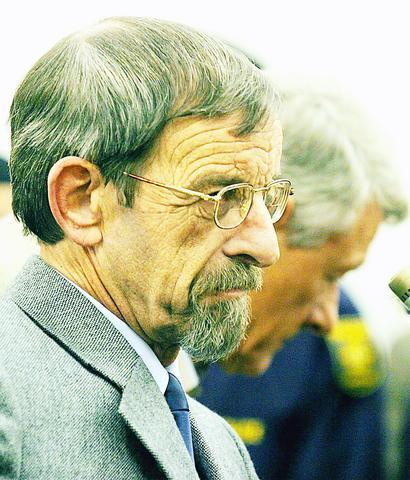A probe into a global nuclear smuggling ring widened Thursday as two Germans were charged by a South African court with illegally exporting equipment to enrich uranium, a key ingredient for making bombs.
Gerhard Wisser, 66, and Daniel Geiges, 65, living permanently in South Africa, appeared before a local court on four counts of contravening the Nuclear Energy Act and a law banning the proliferation of weapons of mass destruction.

PHOTO: AP
Their arrests followed that of a South African businessman over his alleged involvement in a nuclear smuggling network thought to be linked to Pakistani scientist Abdul Qadeer Khan and aimed at helping Libya develop atomic weapons.
The two Germans "unlawfully and intentionally imported, held in transit and exported goods which may contribute to the design, development, production, deployment, maintenance or use of weapons of mass destruction without a permit," the charge sheet said.
The three other charges relate to the possession, manufacture and export of equipment for the enrichment of uranium.
The case against the two men was postponed in the Vanderbijlpark regional court, 80km south of Johannesburg, for a formal bail application on Tuesday. The two men were not asked to plead.
Last Thursday, South African businessman Johan Meyer was arrested for his alleged links to the international network and charged with possessing sensitive nuclear-related equipment and clandestinely importing and exporting nuclear material.
But the charges were abruptly dropped on Wednesday, and the Germans were arrested the same day, fuelling speculation that the 53-year-old Meyer had agreed to cooperate with the state in exchange for immunity.
Lawyer Kevin Cross, who represents Geiges, told reporters his client "vehemently denies the charges against him."
"It came as a complete shock to my client and we are going to fight this tooth and nail," he said.
Cross said Geiges was an engineer at a firm north of Johannesburg.
Appearing for Wisser, lawyer Anant Choudree said they were talking to police investigators to find out the exact nature of the charges.
"At this stage, we do not know what the exact charges are and need to consult with our client."
The two men are to remain in police custody pending further hearings.
German prosecutors detained Wisser last month on suspicion of having served as an intermediary in 2001 between the international network and a South African company designated to deliver equipment such as centrifuge pipes used in the enrichment of uranium to Libya.
Khan admitted in February to helping Libya, Iran and North Korea develop their weapons programs and he was later granted a pardon from President Pervez Musharraf.
Libya announced late last year that it was abandoning attempts to develop nuclear, biological and chemical weapons after months of secret negotiations with London and Washington.

A fire caused by a burst gas pipe yesterday spread to several homes and sent a fireball soaring into the sky outside Malaysia’s largest city, injuring more than 100 people. The towering inferno near a gas station in Putra Heights outside Kuala Lumpur was visible for kilometers and lasted for several hours. It happened during a public holiday as Muslims, who are the majority in Malaysia, celebrate the second day of Eid al-Fitr. National oil company Petronas said the fire started at one of its gas pipelines at 8:10am and the affected pipeline was later isolated. Disaster management officials said shutting the

US Vice President J.D. Vance on Friday accused Denmark of not having done enough to protect Greenland, when he visited the strategically placed and resource-rich Danish territory coveted by US President Donald Trump. Vance made his comment during a trip to the Pituffik Space Base in northwestern Greenland, a visit viewed by Copenhagen and Nuuk as a provocation. “Our message to Denmark is very simple: You have not done a good job by the people of Greenland,” Vance told a news conference. “You have under-invested in the people of Greenland, and you have under-invested in the security architecture of this

Japan unveiled a plan on Thursday to evacuate around 120,000 residents and tourists from its southern islets near Taiwan within six days in the event of an “emergency”. The plan was put together as “the security situation surrounding our nation grows severe” and with an “emergency” in mind, the government’s crisis management office said. Exactly what that emergency might be was left unspecified in the plan but it envisages the evacuation of around 120,000 people in five Japanese islets close to Taiwan. China claims Taiwan as part of its territory and has stepped up military pressure in recent years, including

UNREST: The authorities in Turkey arrested 13 Turkish journalists in five days, deported a BBC correspondent and on Thursday arrested a reporter from Sweden Waving flags and chanting slogans, many hundreds of thousands of anti-government demonstrators on Saturday rallied in Istanbul, Turkey, in defence of democracy after the arrest of Istanbul Mayor Ekrem Imamoglu which sparked Turkey’s worst street unrest in more than a decade. Under a cloudless blue sky, vast crowds gathered in Maltepe on the Asian side of Turkey’s biggest city on the eve of the Eid al-Fitr celebration which started yesterday, marking the end of Ramadan. Ozgur Ozel, chairman of the main opposition Republican People’s Party (CHP), which organized the rally, said there were 2.2 million people in the crowd, but